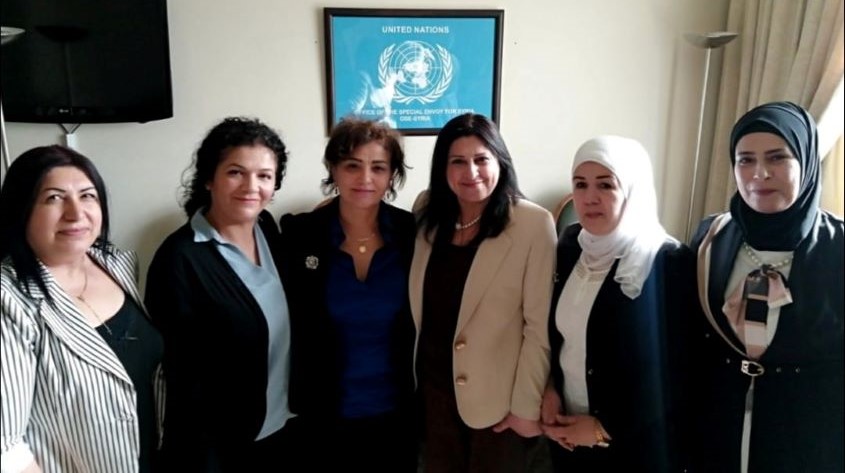Syriac Women’s Union Delegation Meets UN Deputy Special Envoy in Daramsuq (Damascus)
DARAMSUQ (DAMASCUS), Syria — On Wednesday, April 23, a delegation of women representing various organizations from North and East Syria met with Najat Rochdi, the UN Deputy Special Envoy for Syria, in the Syrian capital. Among the participants was Sabah Shabo, a representative of the Syriac Women’s Union in Syria (Huyodo d’Neshe d’Bethnahrin, HNB), who brought attention to critical issues surrounding political inclusivity, transitional justice, and the role of women in shaping Syria’s future.
The meeting centered on the political landscape of Syria following the collapse of the previous regime and the announcement of the transitional government. Delegates emphasized the urgent need for inclusive political participation, ensuring all components of Syrian society—regardless of ethnic or religious background—have a voice in the transition process. They stressed that sustainable peace hinges on building a governance framework that reflects Syria’s diverse population.
A key topic of discussion was the importance of transitional justice, with calls for holding perpetrators of past atrocities accountable and establishing robust legal mechanisms to prevent the repetition of such crimes. Delegates emphasized the implementation of UN Resolution 2254, which provides a roadmap for a political solution in Syria, including constitutional reforms and fair elections. Ensuring the safe and dignified return of displaced Syrians to their homes was another critical priority highlighted during the talks.
Discussions turned to the vital role of Syrian women in the transitional phase, particularly their participation in writing the new constitution and contributing to policymaking. Delegates advocated for empowering women through education, leadership training, and ensuring their representation in key decision-making roles within the transitional administration. They noted that women’s inclusion is not just symbolic but fundamental to ensuring long-term social and political stability.
Representing the HNB, Sabah Shabo addressed the unique challenges faced by Syriac women and their broader community. Shabo emphasized that the Syriac people should no longer be seen solely as a religious minority but as an indigenous population demanding political, cultural, and linguistic rights alongside religious freedoms. She underscored the importance of enshrining these rights in the new constitution, ensuring they are treated equally alongside all Syrian communities.
Shabo also highlighted the historical marginalization of Syriac Christians, noting that past frameworks often limited their recognition to religious contexts. “Today, as an ancient and integral part of Syria’s heritage, Syriac people are demanding broader rights—on equal footing with others in shaping the nation’s future,” she said during the meeting.
The meeting ended with a shared commitment to advancing women’s roles in Syria’s governance and ensuring the aspirations of all communities are represented in its political and legal frameworks. The delegates expressed hope that these discussions would pave the way for a more inclusive and equitable Syria, with transitional justice and women’s empowerment as core pillars of the rebuilding process.
This conversation reflects an ongoing effort to elevate underrepresented voices in Syria’s transition, ensuring justice and inclusivity in reshaping the nation’s future.


















